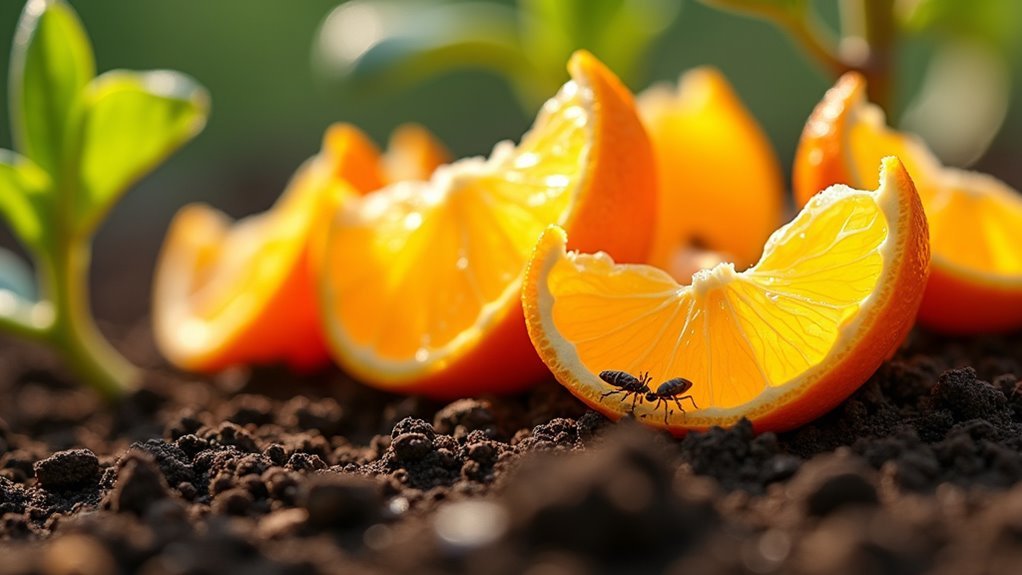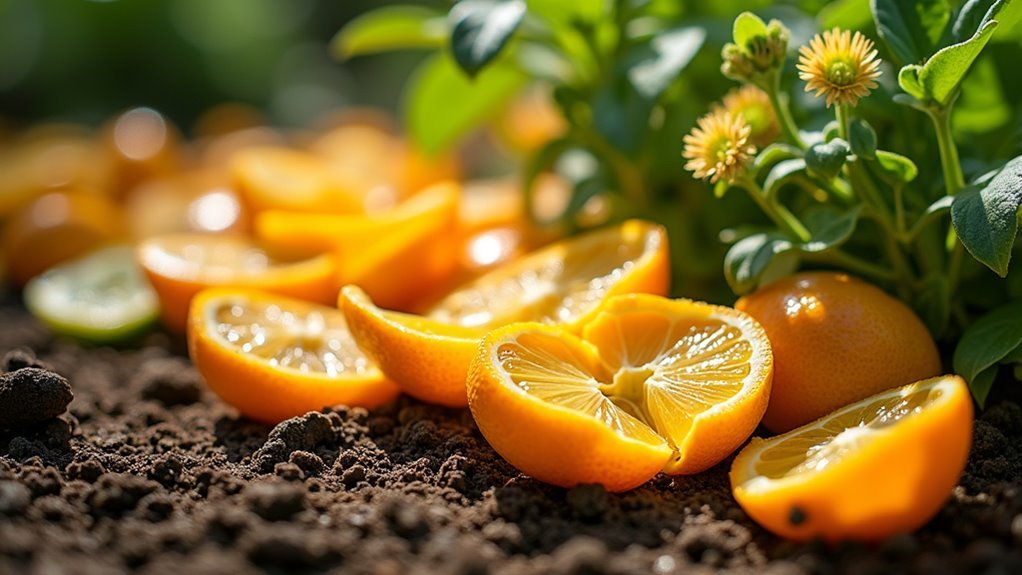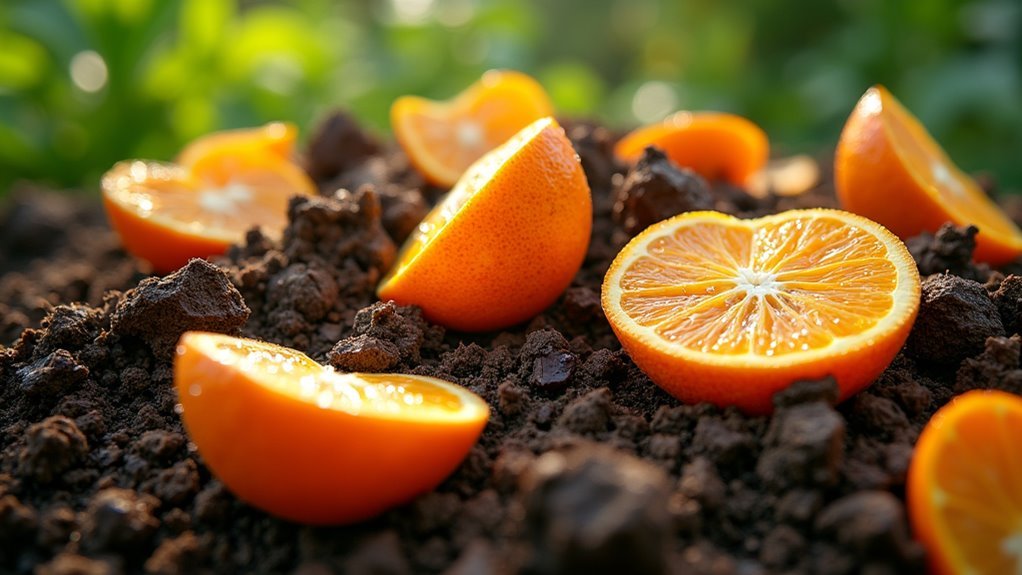Citrus peels aren’t the garden pest miracle you’ve been promised. While orange peels contain d-limonene, their natural concentration falls below 1.2% – insufficient for effective pest control against most insects. However, you can use them strategically as animal deterrents against cats and dogs, create concentrated sprays for soft-bodied insects, or compost them for soil benefits. The key is managing expectations and understanding that citrus peels work best when combined with proven organic pest control methods for thorough garden protection.
The Science Behind Citrus Peels and Pest Control

While citrus peels have gained popularity as a natural garden pest deterrent, the science reveals a more complex reality.
You’ll find that citrus peels contain less than 1.2% d-limonene, a compound with insect-repelling properties, but this concentration isn’t sufficient for effective pest control.
Though essential oils from these peels can repel garden pests, they require much higher concentrations than what’s naturally present. The oils’ rapid evaporation further diminishes their effectiveness as they quickly dilute in air.
While citrus peels contain pest-repelling compounds, their natural concentrations are too low and evaporate too quickly for effective garden protection.
Research shows citrus peels may deter specific pests like ants and aphids, but their overall effectiveness remains limited.
For reliable pest control, you’re better off using organic insecticides and enhancing biodiversity in your garden.
Understanding D-Limonene Concentrations in Orange Peels
Although orange peels contain d-limonene, you’ll discover that their natural concentration typically falls below 1.2%—far too low to effectively repel garden pests. This minimal amount won’t provide the pest repellent power you’re seeking for your garden settings.
You’re facing another challenge: d-limonene’s volatile nature causes rapid evaporation from orange peels, eliminating any long-lasting protection.
While d-limonene does possess antimicrobial properties, these low concentrations simply can’t deliver effective pest control against determined insects.
If you want reliable results, you’ll need commercial products containing higher citrus oils concentrations rather than depending solely on kitchen scraps.
These concentrated formulations maintain the natural benefits of d-limonene while providing the potency necessary for successful pest management in your garden.
Effective Applications for Cat and Animal Deterrence

Despite their limitations against insects, orange peels prove remarkably effective at deterring cats and other animals from your garden spaces.
Orange peels create a natural, chemical-free barrier that effectively keeps cats and other garden pests away from your plants.
You’ll find that strategically scattered orange peels create an unpleasant scent barrier around flower beds and vegetable patches, keeping feline pests away naturally. The strong citrus aroma makes this deterrent particularly potent against neighborhood cats and dogs.
You can place larger peel pieces throughout affected areas for maximum impact. This eco-friendly approach lets you coexist peacefully with pets while protecting your plants without harsh chemicals.
As an added bonus, the peels eventually decompose into your soil, delivering essential nutrients that benefit plant growth. This dual-purpose solution transforms garden waste into effective pest control while creating valuable compost for healthier gardening.
Creating Citrus-Based Sprays for Soft-Bodied Insects
Moving beyond animal deterrence, you can transform orange peels into powerful liquid weapons against soft-bodied garden pests.
Steep citrus peels in boiling water overnight to extract d-limonene, a natural pesticide that targets aphids and spider mites effectively. Once cooled, dilute this concentrated mixture with water for safe plant application.
Add several drops of dish soap to improve the spray’s adhesion to plant surfaces and enhance coverage on pests. Apply directly to infested areas where soft-bodied insects gather.
Test the solution on a small plant section first to prevent adverse reactions.
Reapply regularly, especially after rain or watering, since moisture reduces effectiveness.
This homemade spray provides an eco-friendly alternative to chemical pesticides while utilizing kitchen waste productively.
Composting Orange Peels for Long-Term Soil Benefits

You’ll transform orange peels into a powerful soil amendment by adding them to your compost pile, where they’ll contribute essential nutrients like nitrogen, phosphorus, and potassium.
Chop or grind the peels before composting to speed up decomposition and guarantee faster nutrient release into your soil.
Keep orange peels to about 10% of your total compost volume to maintain the proper carbon-to-nitrogen balance for ideal composting results.
Nutrient-Rich Compost Addition
Orange peels transform from kitchen scraps into garden gold when you add them to your compost pile.
These citrus scraps pack nitrogen, phosphorus, and potassium that enhances your compost’s nutrient content greatly. You’ll boost plant health while improving soil structure and water retention throughout your garden.
Chop your orange peels into smaller pieces to speed decomposition and accelerate nutrient release.
Keep citrus materials around 10% of your total compost volume to maintain the proper carbon-to-nitrogen ratio for best results.
Proper Decomposition Techniques
The key to successful orange peel composting lies in proper preparation and monitoring techniques that maximize decomposition while preventing common pitfalls.
You’ll want to chop your orange peels into small pieces and dry them before adding to compost. This reduces waxy skin interference and improves moisture content for faster breakdown.
Keep orange peels under 10% of total compost volume to maintain proper nitrogen ratio balance. Regular soil pH monitoring is essential since citrus naturally lowers acidity levels.
These organic materials enhance soil tilth and water retention while creating beneficial conditions for beneficial insects. When decomposed correctly, your orange peels become both excellent pest repellent and nutrient-rich soil amendment for long-term garden health.
Expert Analysis on Citrus Peel Effectiveness
You’ll find that scientific evidence supporting citrus peels as effective pest deterrents is surprisingly limited.
Expert analysis reveals that orange peels contain less than 1.2% limonene—a concentration that’s simply too low to reliably repel garden pests.
Instead, agricultural entomologists recommend proven strategies like crop rotation and biodiversity promotion for natural pest management that actually works.
Scientific Evidence Lacking
While citrus peels contain essential oils that sound promising for pest control, scientific studies reveal they don’t pack the punch you’d expect. Research shows orange peels typically contain under 1.2% d-limonene, insufficient concentrations to effectively repel pests like insects in your garden.
Expert Gabrielle LaTora, an agricultural entomologist, stresses that scientific evidence is vital for reliable pest management strategies. She highlights the limited efficacy of citrus peels against garden insects. The essential oils that give citrus peels their repellent properties evaporate quickly outdoors, drastically reducing their effectiveness.
Current scientific evidence simply doesn’t support citrus peels as dependable insect deterrents. While they might deter some larger animals, you shouldn’t rely on them for serious pest control.
Experts recommend proven alternatives like organic insecticides instead.
Professional Recommendations Instead
Instead of scattering citrus peels around your garden, agricultural experts recommend proven alternatives that’ll actually protect your plants. Agricultural entomologists emphasize that citrus peels are ineffective because they lack sufficient concentrated oils needed for pest control.
You’ll get better results using commercial products containing high-concentration essential oils specifically formulated for garden protection.
Professional pest management focuses on integrated pest management strategies rather than relying on home remedies. You should implement crop rotation, promote biodiversity in your garden, and select organic insecticides tailored to your specific pest problems.
These science-backed approaches provide reliable, long-term protection for your plants while maintaining environmental balance in your garden ecosystem.
Alternative Natural Pest Control Methods That Actually Work
Beyond citrus peels, gardeners can employ several proven natural pest repellent methods to keep pests at bay without reaching for harsh chemicals.
You’ll find crop rotation particularly effective since it disrupts pest life cycles by changing plant types seasonally. Trap crops work brilliantly—they’ll lure garden pests away from your main plants, protecting valuable harvests.
Physical barriers like fine mesh covers create impenetrable shields while allowing essential sunlight and moisture through.
When you promote biodiversity by planting varied species, you’re attracting beneficial insects such as ladybugs and lacewings that naturally control pest populations.
Organic insecticides including Bacillus thuringiensis and neem oil target specific pests effectively.
These pest control methods prove that natural approaches work reliably. Even your citrus peels can become valuable compost materials, enriching soil while continuing their pest-deterrent properties.
Maximizing Garden Value While Managing Realistic Expectations
Although citrus peels offer genuine benefits for your garden, understanding their limitations prevents disappointment and helps you make informed decisions. While they won’t effectively repel garden pests due to insufficient scientific evidence, you can maximize their value through composting. Their nutrients enrich soil when properly decomposed, supporting long-term garden health.
| Strategy | Effectiveness | Best Use |
|---|---|---|
| Citrus peels as repellent | Low | Avoid direct placement |
| Composting citrus peels | High | Soil enrichment |
| Commercial organic pest control | High | Primary pest management |
| Crop rotation | High | Prevention strategy |
| Integrated approach | Highest | All-encompassing solution |
Maintain realistic expectations about citrus peels’ pest-repelling abilities. They may attract unwanted wildlife, creating additional problems. Instead, focus on integrating strategies that combine effective organic pest control methods while utilizing citrus peels’ composting benefits. This balanced approach delivers better results.
Frequently Asked Questions
Do Citrus Peels Keep Bugs Away?
You’ll find that citrus peels don’t effectively repel most bugs. While they contain d-limonene, concentrations are too low, and essential oils evaporate quickly, making commercial products more reliable.
What Animals Do Citrus Peels Repel?
You’ll find citrus peels effectively repel cats and dogs from your garden areas. They also deter some small mammals and certain insects like ants, though they won’t keep larger wildlife away.
Can I Put Citrus Peels in My Garden?
You can put citrus peels in your garden, but they’re best composted first. Chop them up and limit to 10% of compost volume for faster decomposition and better soil enrichment.
Do Citrus Peels Repel Rodents?
You’ll find citrus peels may help deter rodents due to their strong scent, but they’re not scientifically proven effective. Don’t rely on them alone for rodent control in your garden.
In Summary
You’ll find citrus peels offer a practical, eco-friendly approach to garden pest management when you understand their limitations. Don’t expect miracles, but you can effectively deter cats, repel certain insects, and improve your soil through composting. Combine citrus methods with other natural deterrents for best results. You’re creating a sustainable garden ecosystem that’s safer for beneficial insects while reducing waste. Start experimenting with different citrus applications to discover what works in your specific garden conditions.





Leave a Reply